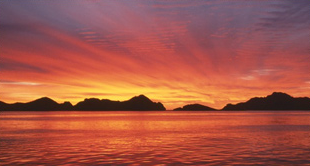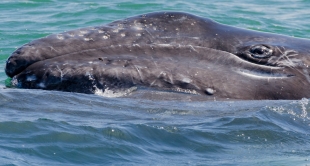Shall we? Or better not? Is it disturbing? Or even expected and desired?
Questions that you might only be able to answer for yourself – like so many other questions in life.
And questions that probably will never be answered comprehensively. We are talking about Whale and Dolphin Watching excursions.
To antedate, my personal answer to this question is:
YES, we should go out on the oceans to encounter dolphins and whales!
Whenever I talk about Whale Watching, I am referring to a respectful way of Whale Watching and not to the mass touristy “I don’t care about the animals – its only about business” ways of offering them.
The small problem of Dolphin and Whale Watching is, that the nowadays so elegant and graceful animals decided to leave their habitat on land went back into the water, hence the Ocean. The result of a 90 million years evolutionary process leaves us now ecstatic, beaming, touched in depth or quiet but always impressed – mostly on a boat.
Dolphins and Whales – fascinating cetaceans – allure millions of people to go on the oceans. Even though it is not comfortable for everybody to get on a rocking boat, many are doing it anyways. And it gets evident – we are living in different elements. We only have the chance to visit them temporarily – the ocean is not our home. The cetaceans on the other hand should really refrain from visiting us on land since running ashore often concludes in death.
The Whale Watching history started in California where in the 50s of the past century, fishers took guests with them on their boats to encounter the migrating Gray whales. In the end of the nineties Whale Watching became a booming tourism branch.
By now there are about 30 million people each year who try their luck in 120 countries.
Well, and shall we do that?
Obviously, when going out on the ocean, for example with our OCEANO Gomera boats off the small Canary Island La Gomera, we exert influence. With our boats we cannot behave as if we do not exist
We are heard. As said, one has to be conscious about that our attendance will be recognized – cetaceans live in a world of sounds. Each day, each trip our influence depends on our behavior out there. Am I a polite guest or a pain in the neck?
We should care about – and that’s also what the Canary WW regulations prescribe – that we keep our impact as small as possible and that we always behave predictable. Respectful Whale Watching explained shortly: We are the guests and the whales and dolphins are our hosts.
We move around in their eating, living rooms and bedrooms. What do we expects from guests in our homes? Sure, that they behave appropriate – then they will be gladly welcomed again.
Important aspects and rules of behavior are: Stick to your course – be predictable.
Let the animals approach. If they want to and are not engaged elsewhere, they will get in contact.
Drive especially carefully and attentive if calves and juveniles are amongst them.
Depending on the situation – switch of the engine. The silence on the ocean and the strong sound of the breathing of the animals is magnificent. Unfortunately this often implies also strong movement of the boat so it is not always possible.
Let go and move on after a beautiful encounter. The moment we recognize that our presence is not desired, we leave.
(Something like not separating a mother from her calf I do not even mention because this is so obvious to me and the perception of this let my hair stand on end.…)
Very important factor: How many boats are close by and do they communicate via radio?
As in 1996 the first Whale Watching laws were established for the Canary Islands, the dolphins were not allowed to ride in the bow wave. Just that they didn’t know that. Boats that were caught with dolphins in their bow wave had to pay a fine!
After a couple of years they adapted those laws because it was acknowledged that they were lacking practical relatedness since the dolphins are the ones, looking for contact. They love to do so with big whales and so do they with boats.
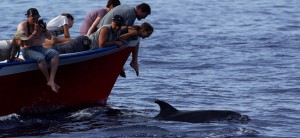
My personal opinion: Whale and Dolphin Watching enriches us people so immensely, it is precious for the Habitat Ocean and environmental education as its finest when we just behave ourselves out there!
Sure, as a guest you have to trust the crew of the boat that they are doing the right thing. Furthermore I’m convinced that the protests against whaling and the annual, barbarian mass murdering of dolphins and whales (Japan: the bay Taiji and the Faeroe islands) and the efforts for protection of the oceans would not have such a great lobby if it weren’t for the Whale Watching.
And yes, it is true, this lobby is still too small according to my taste – facing the economic orientated interests of the ocean polluting and exploiting, as if there would be no tomorrow, industrial fishery. Not to mention the noise pollution of the oceans due to the increasing freight traffic in the course of the globalization.
Also this reflects on us: How do I behave day-to-day? Am I a part of the solution or the problem?
Swimming with dolphins? Another controversial discussed topic. Leading protection organizations are strictly against it.
We offer journeys with dolphin swimming. My personal opinion is that we have much less impact as a swimmer than as a boat. Often we observe how slowly and inelegant we move in this element which is simply not ours.
Dolphin swimming yes – but for me only in the wild and in appropriate circumstances – I would never get into a pool with a dolphin. Surely not in a Petting pool.
Again here: the respectful behavior: I am the guest and the dolphin is the host. They decide if they want to get in contact or not. Save attendant circumstances. Well prepared swimmer in the water with a receptive attitude. Pay respect, stay receptive – they are vigorous animals!
Following this, it can be a unique and life changing experience. What a dainty sight to see and probably even hear a small dolphin group in the marvelous blue of the ocean.
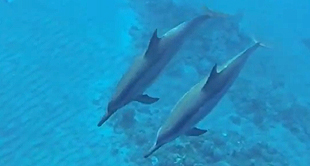
To make this clear: I am no fan of dolphins in captativityand especially not when it comes to Orcas in tanks and do definitely have to go into the water to swim with dolphins at any price (I also got out of the water when I had the feeling that there were too many swimmer in the water and the situation wasn’t right). It is not necessary to create a sensation for all the consume spoiled tourists who ask after an amazing whale encounter “and where are the dolphins now?” but it is about flexibility to take nature as it is in this very specific moment: any encounter, any excursion, any day on the ocean is different and demands from us, the guides and the captain an appropriate behavior matching the specific situation.
What I really don’t like are researcher that are against swimming with dolphins but are the first ones in the water, preferably with a special permission.
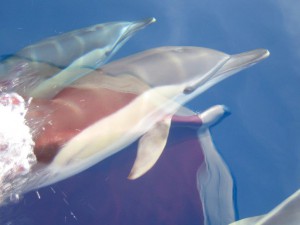
And while we are already asking ourselves: Maybe it would be more important that we take even better care of their habitat, which we humans currently use as waste deposit and much more. And their means of existence? Because there are not so many fishes left in the ocean. Without fish no dolphins and whales – easy calculation.
Maybe Whale Watching can be a marginal disturbance given the huge problems of the oceans?
I am thinking about for example Fukushima. How many millions liter of radioactive contaminated water was and still is flowing in the ocean? Eventually the whole Pacific Ocean is affected. No body, and especially not the media is talking about it. It drives me nuts. Why not? The whole Pacific ocean is in danger. Hardly anybody taking about it. Why? Because it is so far away?
Oceans are not only important for cetaceans but also for us humans and our next generations. They are our livelihood.
The Cleanup Ocean Project (www.theoceancleanup.com) contributes to that in a very interesting way.
Additionally there is the other aspect – what kind of creatures are dolphins and whales?
These endotherm animals with a bigger brain than the human one, those self-recognizing beings and emphatic networker…? Those biologically highly developed animals with lots of interesting capabilities? (Read more about that in the next blog entry)
How do they perceive us? As a disruptive factor? Welcome diversification? We do not know it exactly – and at the same time they behave as if they would be happy about our visit: Friends are coming by. Everywhere on the world, examples of interested interspecies encounters can be observed. Frequently the interest does not only exist on our side.
In friendship with dolphins and whales.




